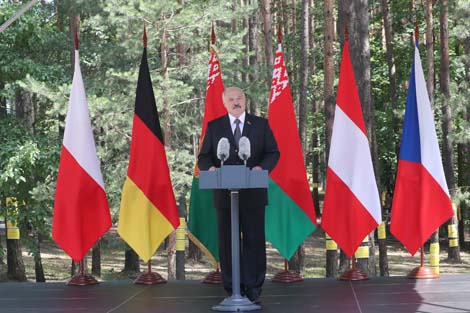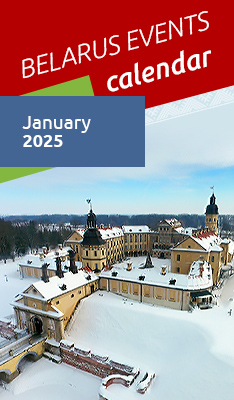News & Events in Belarus
Belarus president: The dreadful past must not be revived

MINSK, 29 June (BelTA) – Truth about the past war must live on while the dreadful past must not be revived. Belarus President Alexander Lukashenko made the relevant statement during the requiem rally held at the site of the former death camp Trostenets on 29 June to commemorate Nazism victims, BelTA has learned.
“Since we have a unique opportunity to know the truth about that war from the stories told by those, who experienced it firsthand, the most important thing we should do is to preserve this memory and prevent a revival of the dreadful past. History has demonstrated in no uncertain terms that one cannot ignore evil even if it is only a nascent idea. Its transformation into a real threat is only a matter of time,” stressed the Belarusian head of state.
“We represent different nations, different faiths. We live in different countries. Politicians and public figures, we stand here because we remember the tragic lessons of the common history. We know how human lives were devalued by the ideology of Nazism, which turned the world upside down with crimes unparalleled in their cruelty,” said Alexander Lukashenko.
In his words, death camps were the most incomprehensible phenomenon of World War Two. The new commemorative object in Blagovshchina has been erected at the site of one of the largest death camps. “Jews from Berlin, Bremen, Vienna, Dortmund, Prague, and other European cities were forced to walk the path of death here. Ashes of Belarusian civilians, underground resistance fighters and partisans, and Soviet POWs rest here, too,” noted the president. “Butchers driven by the antihuman Nazi idea were hell-bent on exterminating everyone, who didn’t fit their perverse concept of the new world order.”
The head of state noted that with this memorial Belarusian architects had managed to demonstrate the fine line between life and death, which separates living breathing human beings from a pile of ashes. He thanked the presidents, politicians, and public figures, who had turned up for the rally, as well as representatives of religious organizations, leaders and residents of European citizens, all the indifferent people, whose common efforts help memory about Trostenets death camp victims live on.
Alexander Lukashenko urged everyone to support the Belarusian initiative for creating a digital book of memory of Trostenets victims.
The head of state also remarked that participants of the event had been driven together by the painful memory of the dreadful events of World War Two. Alexander Lukashenko stressed that the unity of the participants of the requiem rally was the key symbol of the meeting.







 print version
print version make home page
make home page add to bookmarks
add to bookmarks

